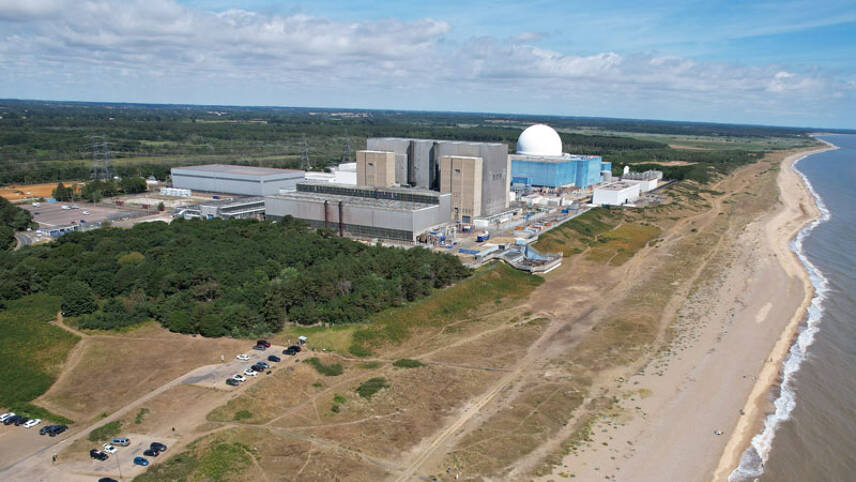Register for free and continue reading
Join our growing army of changemakers and get unlimited access to our premium content

Pictured: Sizewell A and B
Prime Minister Rishi Sunak and Energy Security and Net-Zero Secretary Grant Shapps are in Scotland at present and have tabled a series of meetings with the nuclear, renewables and fossil fuels sectors with a focus on energy security.
Resulting from meetings in the nuclear sector is a new industry taskforce that will be asked to map current and predicted skills gap, before proposing and delivering interventions. These will cover training those entering the workforce for the first time, as well as upskilling and reskilling.
MPs on the Science, Innovation and Technology Committee warned on Monday (31 July) that, if the UK is to meet its target to host up to 24GW of nuclear capacity by 2050, its nuclear energy workforce will need to more than double. Some 65,000 people work in the sector at the moment. The Committee estimates that between 75,000 and 150,000 new recruits will be needed.
Sir Simon Bollom, the former chief executive of the arms-length Government body Defence Equipment and Support, has been selected to chair the new nuclear skills taskforce.
He will be supported by Ministers from the Department for Energy Security and Net-Zero (DESNZ), the Department for Education and the Ministry of Defence. Taskforce members from the private sector, academia and professional bodies will be announced in the near future.
Nuclear Minister Andrew Bowie said: “The UK’s nuclear revival, with the launch of Great British Nuclear, will put us centre-stage in the global race to unleash a new generation of nuclear technology.
“The Nuclear Skills Taskforce will support this expansion by securing the skills and workforce we need to deliver this, opening up exciting opportunities and careers to help bolster our energy security.”
Great British Nuclear is an arms-length body responsible for driving the delivery of new nuclear projects, via engagement and investment across the value chain. It was first announced at the Budget in spring and launched its first funding competition last month, with an initial focus on Small Modular Reactors (SMRs).
MPs sound the alarm on nuclear skills, funding and innovation
MPs on the Science, Innovation and Technology Committee this week urged the Government to turn its top-line visions for expanding the UK’s nuclear capacity into “specific commitments” that are time-bound and clearly allocated.
The Committee accused the Government of having a “wish list” rather than a comprehensive plan for closing the impending nuclear gap and ensuring that a quarter of UK electricity generation is nuclear in 2050. This goal was set through the Energy Security Strategy in spring 2022.
Following conversations with industry experts and the analysis of written evidence, the Committee is recommending the creation of a new Strategic Plan for Nuclear – to be agreed upon before the next general election. This Plan should include the whole value chain and be designed to last across Governments in the coming years and decades, ending years of “intermittent” policymaking.
Such a plan should set out, clearly, which mix of technologies will be used to meet 2050 targets. Industry is seeking clear direction on the role of SMRs, advanced technologies and existing options for large plants, the Committee’s report states.
There should also be firm plans for financing these technologies. Beyond Great British Nuclear’s initial competition, the SMR sector is seeking assurances, MPs have been told. Taxpayers are also seeking information about whether SMRs and large projects are good value for money, but much data is currently kept private due to commercial sensitivity.
The cost of large nuclear has been a hot topic this summer. The UK Government recently confirmed the allocation of a further £170m for the Sizewell C nuclear power station, intended to accelerate pre-construction preparations. Developer EDF estimates that the project will cost more than £20bn to deliver and expects around 60% of the cost to be footed by private investment – the majority of which is yet to be confirmed.
Summarising the Science, Innovation and Technology Committee’s report, its chairman Greg Clark said: “[24GW] would be almost double the highest level of nuclear generation that the UK has ever attained. The only way to achieve this is to translate these very high-level aspirations into a comprehensive, concrete and detailed Nuclear Strategic Plan which is developed jointly with the nuclear industry, which enjoys long-term cross-party political commitment and which therefore offers dependability for private and public investment decisions.
“Done right, the UK can be in the vanguard of delivering nuclear innovation, jobs and clean, affordable and reliable energy. But there is now an urgent need to turn hopes into actions.”


The idea of building new large reactors lost any sense years ago, as complete nonsense.
The only new reactors which might be considered are small ones such as the Rolls Royce one in development